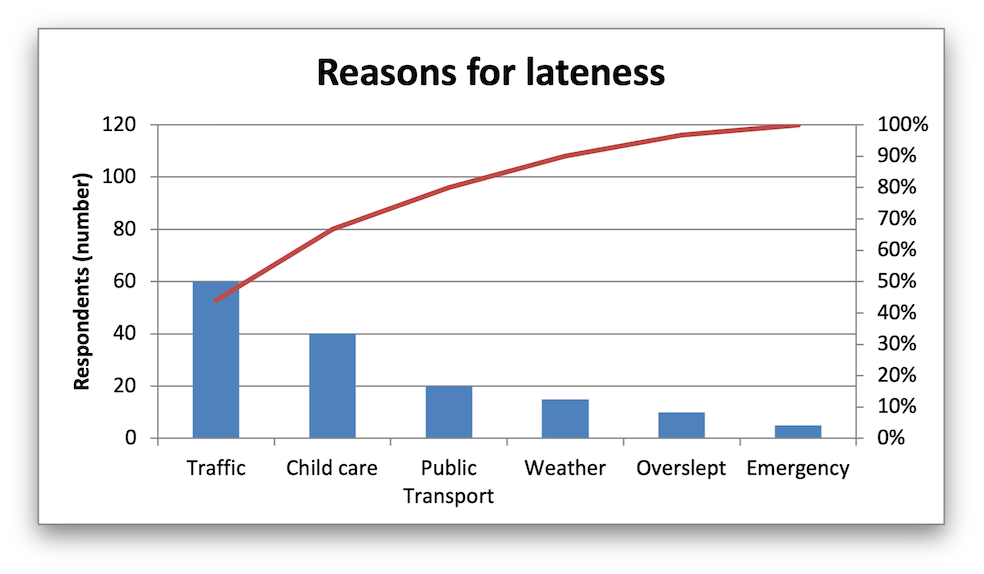Chart: Create a combined pareto chart
Example of creating a Pareto chart with a secondary chart and axis.
A Pareto chart is a type of chart that combines a Column/Histogram chart and a Chart. Individual values are represented in descending order by the columns and the cumulative total is represented by the line approaching 100% on a second axis.
Image of the output file:

Code to generate the output file:
// SPDX-License-Identifier: MIT OR Apache-2.0
//
// Copyright 2022-2026, John McNamara, jmcnamara@cpan.org
//! An example of creating a Pareto chart using the `rust_xlsxwriter` library.
use rust_xlsxwriter::{Chart, ChartType, Format, Workbook, XlsxError};
fn main() -> Result<(), XlsxError> {
let mut workbook = Workbook::new();
let worksheet = workbook.add_worksheet();
// Formats used in the workbook.
let bold = Format::new().set_bold();
let percent_format = Format::new().set_num_format("0%");
// Add the worksheet data that the charts will refer to.
let headings = ["Reason", "Number", "Percentage"];
let reasons = [
"Traffic",
"Child care",
"Public Transport",
"Weather",
"Overslept",
"Emergency",
];
let numbers = [60, 40, 20, 15, 10, 5];
let percents = [0.440, 0.667, 0.800, 0.900, 0.967, 1.00];
worksheet.write_row_with_format(0, 0, headings, &bold)?;
worksheet.write_column(1, 0, reasons)?;
worksheet.write_column(1, 1, numbers)?;
worksheet.write_column_with_format(1, 2, percents, &percent_format)?;
// Widen the columns for visibility.
worksheet.set_column_width(0, 15)?;
worksheet.set_column_width(1, 10)?;
worksheet.set_column_width(2, 10)?;
//
// Create a new Column chart. This will be the primary chart.
//
let mut column_chart = Chart::new(ChartType::Column);
// Configure a series on the primary axis.
column_chart
.add_series()
.set_categories("Sheet1!$A$2:$A$7")
.set_values("Sheet1!$B$2:$B$7");
// Add a chart title.
column_chart.title().set_name("Reasons for lateness");
// Turn off the chart legend.
column_chart.legend().set_hidden();
// Set the name and scale of the Y axes. Note, the secondary axis is set
// from the primary chart.
column_chart
.y_axis()
.set_name("Respondents (number)")
.set_min(0)
.set_max(120);
column_chart.y2_axis().set_max(1);
//
// Create a new Line chart. This will be the secondary chart.
//
let mut line_chart = Chart::new(ChartType::Line);
// Add a series on the secondary axis.
line_chart
.add_series()
.set_categories("Sheet1!$A$2:$A$7")
.set_values("Sheet1!$C$2:$C$7")
.set_secondary_axis(true);
// Combine the charts.
column_chart.combine(&line_chart);
// Add the chart to the worksheet.
worksheet.insert_chart(1, 5, &column_chart)?;
workbook.save("chart_pareto.xlsx")?;
Ok(())
}